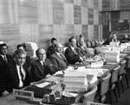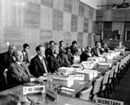|
Vienna Convention on Succession of States in Respect of
State Property, Archives and Debts Vienna, 8 August 1983
By Anthony Aust
British Diplomatic Service (1967-2002), retiring as Deputy Legal Adviser Legal Adviser (Counsellor) to the United Kingdom Mission to the United Nations in New York, 1988-1991
In 1967, the International Law Commission (‘the Commission’) began work on the topic of the succession of States in respect of State property, archives and debt. In 1981, the Commission submitted to the United Nations General Assembly a final set of draft articles on the topic with a recommendation that the Assembly should convene a conference of plenipotentiaries to study the draft articles and conclude a convention on the subject. The General Assembly adopted resolutions 36/113 of 10 December 1981 and 37/11 of 15 November 1982 to this effect by which it accordingly decided to convene a United Nations Conference on Succession of States in respect of State Property, Archives and Debt (‘the Conference’) to be held at Vienna from 1 March to 8 April 1983. On 7 April 1983, the Conference adopted the Vienna Convention on the Succession of States in respect of State Property, Archives and Debts (‘the 1983 Convention’). Some twenty-six years after its adoption, however, the 1983 Convention has yet to enter into force. The 1983 Convention requires only fifteen States to consent to be bound by it to enter into force, but, as of 5 August 2009, only seven States have so consented. Although six States signed the 1983 Convention before the 1984 deadline for signature, they have not yet ratified it in accordance with its relevant provisions. Since then, nothing happened until 1991 to 2002 during which time six other States expressed their consent to be bound: Croatia, Estonia, Georgia, the former Yugoslav Republic of Macedonia, Slovenia and Ukraine (in 2005, Liberia also expressed its consent to be bound). The six States may have seen the 1983 Convention as relevant to the settlement of their own succession issues, but only three of the former republics of the Socialist Federal Republic of Yugoslavia (SFRY) thought it worth expressing their consent to be bound (we will see below how their problems were actually resolved). The weaknesses of what became the 1983 Convention were evident at the Conference that lead up to its adoption. The Conference was not able to improve much on the final draft articles produced by the Commission in 1981, as was demonstrated by the vote on adoption: 54 to 11, with 11 abstentions. As with the final draft articles produced by the Commission, the 1983 Convention contained provisions representing progressive development of international law. Thus, it neither fully reflected customary law, nor made new law that would be generally acceptable. It may be that the subject was simply not amenable to prescriptive treatment. As with succession to bilateral treaties, it may be something that has to be dealt with on a case-by-case basis. One of the main flaws of the Commission’s work on the draft text was the heavy reliance throughout on equity as a guiding, but supplementary, principle for the distribution and apportionment of tangible property. This was entirely understandable as a matter of principle, but it contributed to the general lack of effectiveness of the 1983 Convention, making it too vague for application to specific situations. States have to agree on distribution of assets, yet the 1983 Convention gives them no clear or precise guidance how to do it. It is true that, in its Opinions Nos. 1 and 9, the Arbitration Commission of the Conference for Peace in Yugoslavia (also known as the ‘Badinter Commission’) referred to the 1983 Convention as embodying principles of international law relevant to the settlement of disputes between the successor States of the SFRY. However, in the later succession negotiations between the former Yugoslav republics, the principle of equity was of little practical help; old-fashioned horse-trading was the technique most used. Another defect of the 1983 Convention is the undue emphasis on succession of States in the simple case of independence, typically from a colonial power. Thus, the 1983 Convention was not a useful guide to settling the complex problems of succession resulting from the break-up of a State. Before the fall of the Milošević regime, the negotiations for a settlement dragged on, largely because the Federal Republic of Yugoslavia (FRY) persisted in maintaining the attitude that it was not a successor State to the SFRY, but its continuation, in the same way as the Russian Federation was (though in its case correctly) the continuation of the Soviet Union. The 1983 Convention also gave further scope for delaying tactics. Article 8 provides that “State property”’ of the predecessor State is the property owned by it according to its internal law. The SFRY had claimed to be the purist communist State in believing (or so it said) that all property was owned by the people. Under the particular terms of the constitution of the SFRY, property was in “social ownership”, replacing ownership by the State with ownership by society as a whole. Another complication was that the date of succession differed for each of the former republics, and, in each case, it was not easy to determine the exact date. Eventually, following the fall of Milošević, the (then) five successor States of the former Yugoslavia concluded, on 29 June 2001, the Agreement on Succession Issues. It entered into force on 29 June 2004. In practice, although some of the articles of the 1983 Convention concerning State archives were of some assistance, the rest were less helpful, the settlement of the issue of State debts being achieved by lengthy and shrewd bargaining. The real substance of the Agreement is in the fifty pages of detailed annexes. The Agreement does not mention the 1983 Convention. A less complicated example of State succession in respect of State property, archives and debt can be found in the so-called velvet dissolution of Czechoslovakia. The successor States to the former Czechoslovakia favoured a settlement in rough proportion (2:1) to the size of their respective populations, a solution inspired by the equitable principles contained in the 1983 Convention. This Introductory Note was written in August 2009.
Related Materials
At its first session, in 1949, the Commission selected the subject of succession of States and Governments as one of the topics for codification without, however, including it in the list of topics to which it gave priority. At its fourteenth session, in 1962, the Commission was apprised of General Assembly resolution 1686 (XVI) of 18 December 1961, recommending that the Commission include on its priority list the topic of succession of States and Governments. The Commission decided to set up a Subcommittee on the Succession of States and Governments whose task was to submit to the Commission a preliminary report containing suggestions on the scope of the subject, the method of approach to the study and the means of providing the necessary documentation (A/CN.4/149 and Add.1, A/CN.4/150 and A/CN.4/151). At its fifteenth session, in 1963, the Commission considered and unanimously approved the report of the Subcommittee (A/5509). The Commission expressed its agreement with the broad outline, the order of priority of the headings and the detailed division of the topic recommended by the Subcommittee: succession in respect of treaties; succession in respect of rights and duties resulting from other sources than treaties (revised in 1968 to read “succession of States in respect of matters other than treaties”) and succession in respect of membership of international organizations. The Commission approved the Subcommittee’s recommendations concerning the relationship between the topic of State succession and other topics on the Commission’s agenda. At its nineteenth session, in 1967, the Commission appointed Mr. Mohammed Bedjaoui as Special Rapporteur for the sub-topic of succession in respect of rights and duties resulting from sources other than treaties (A/6709/Rev.1 and Corr.l). The Commission considered this sub-topic at its twentieth, twenty-first, twenty-fifth and from its twenty-seventh to thirty-third sessions, in 1968, 1969, 1973 and from 1975 to 1981, respectively. In connection with its consideration of this topic, the Commission had before it the reports of the Special Rapporteur, information provided by Governments (A/CN.4/338 and Add.1–4) as well as documents prepared by the Secretariat (A/CN.4/232). At its twenty-fifth session, in 1973, the Commission decided to limit its study for the time being to only one category of public property, namely property of the State. At the same session, it began the first reading of the draft articles. The Commission completed the first reading of the draft articles on succession of States in respect of State property and State debts at its thirty-first session, in 1979, and on succession in respect of State archives, at its following session, in 1980. In accordance with its Statute, the draft articles adopted by the Commission on first reading were transmitted, through the Secretary-General, to Governments of Member States for their observations. At its thirty-fifth session, the General Assembly adopted resolution 35/163 of 15 December 1980 by which, taking into account the written comments of Governments and views expressed in debates in the General Assembly, it recommended that the Commission should, at its thirty-third session, complete the second reading of the draft articles on succession of States in respect of matters other than treaties adopted at its thirty-first and thirty-second sessions. At its thirty-third session, in 1981, the Commission re-examined the draft articles in the light of the comments of Governments and adopted the final text of its draft articles on succession of States in respect of State property, archives and debts, as a whole, with commentaries (A/36/10). In accordance with its Statute, the Commission submitted the final draft articles to the General Assembly with a recommendation that the Assembly should convene a conference of plenipotentiaries to study the draft articles and conclude a convention on the subject (A/36/10). At its thirty-sixth session, the General Assembly adopted resolution 36/113 of 10 December 1981 by which it decided to convene an international conference of plenipotentiaries to consider the draft articles on succession of States in respect of State property, archives and debts, and to embody the results of its work in an international convention and such other instruments as it might deem appropriate. By the same resolution, the General Assembly also invited Member States to submit their written comments and observations on the final draft articles. The General Assembly further adopted resolution 37/11 of 15 November 1982 by which it decided that the United Nations Conference on Succession of States in respect of State Property, Archives and Debts would be held at Vienna from 1 March to 8 April 1983. The delegations of ninety States participated in the Conference. It had before it written comments of Governments on the final draft articles on succession of States in respect of State property, archives and debts pursuant to General Assembly resolution 36/113 of 10 December 1981, as well as comments made orally on the draft articles in the Sixth Committee of the General Assembly at the thirty-sixth and thirty-seventh sessions of the Assembly (A/CONF.117/5 and Add.1). The Conference assigned to the Committee of the Whole the consideration of the draft articles on succession of States in respect of State property, archives and debts adopted by the International Law Commission. It entrusted to the Drafting Committee, in addition to the responsibility of drafting, coordinating and reviewing all the texts adopted, the preparation of the title, preamble and final clauses of the Convention, as well as the preparation of the Final Act of the Conference. On 7 April 1983, the Conference adopted the Vienna Convention on Succession of States in respect of State Property, Archives and Debts (A/CONF/117/14), consisting of a preamble, fifty-one articles and an annex. The Final Act of the Conference, of which six resolutions adopted by the Conference form an integral part, was signed on 8 April 1983. The Convention was open for signature on 8 April 1983 and remained open for signature until 30 June 1984. The Convention shall enter into force on the thirtieth day following the date of deposit of the fifteenth instrument of ratification or accession. Text of the Convention Selected preparatory documents General Assembly resolution 1686 (XVI) of 18 December 1961 (Future work in the field of the codification and progressive development of international law) The Convention has not yet entered into force. For the current participation status of the Convention, as well as information and relevant texts of related treaty actions, such as reservations, declarations, objections, denunciations and notifications, see:
|








